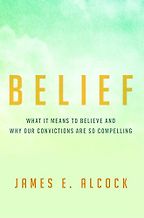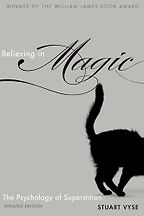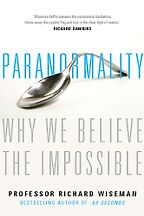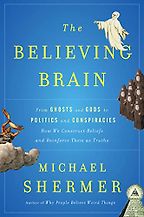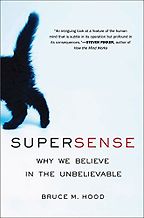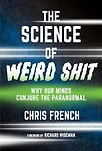Before we get to the books you’ve chosen, maybe you could start by explaining what is meant by paranormal belief. From reading your book, I gather it’s a very broad term, but it’s also very much a part of being a human being. Could you explain?
One important issue is that the term paranormal tends to mean different things to different people. In an academic context, parapsychologists—people who try to use scientific methods to investigate the possibility that certain paranormal phenomena might actually exist—tend to have a very strict definition of the word paranormal.
On the sensory side, they are referring to ESP or extrasensory perception. ESP comes in three different flavors: telepathy (which is the alleged ability of direct mind-to-mind contact), precognition (the alleged ability to know about future events before they happen, other than just by reasoning) and clairvoyance (the alleged ability to pick up information from remote locations without using the known sensory channels).
On the motor side, there is psychokinesis (sometimes called telekinesis) which is the alleged ability to influence the outside world just by the power of the mind. If you claim you can make objects levitate or bend metal just by gently stroking it—it’s that kind of thing.
Then, finally, evidence relating to the possibility of life after death would probably also come within the remit of parapsychologists.
But the media and anomalistic psychologists—which is what I am—tend to have a much wider and looser definition. It can include almost anything weird and wonderful: alien abduction claims, astrology, the Bermuda Triangle, a whole host of other things. So it depends on who you ask.
There are often opinion polls that look at these kinds of beliefs and it’s probably fair to say that a majority of people would endorse at least one paranormal claim. Obviously, some people endorse an awful lot more than one. But these kinds of beliefs are very, very widespread.
From my point of view, as a psychologist, not only are there a lot of people who believe in the paranormal, there’s also a sizable minority who claim that they have had direct personal experience of the paranormal. That is true across time and space. So either some of these paranormal claims might actually be true or, alternatively, they’re telling us something important about the way the human mind works. Either way, it’s worth taking them seriously.
You’ve obviously taken paranormal beliefs very seriously in your work as a psychologist, but on a personal level, you used to believe in them. You weren’t always a skeptic, is that right?
Yes, as a teenager growing up and even well into young adulthood, I did believe in a lot of this stuff. I was just fascinated by it. It is the kind of topic that people do find fascinating. People talk about it down at the pub or at dinner parties. Many have their own personal anecdotes to tell. Especially if they find out you’re a skeptic, they’ll say, ‘Okay, smarty pants, see if you can explain this’ and they trot out an experience they had.
I wasn’t obsessed with it, but I was very interested. When New Scientist magazine ran a survey on paranormal belief and whether there should be more research into it, I took the trouble—this was pre-internet days—to fill out the questionnaire, put it in an envelope and take it to the post office.
Even going through a psychology degree, I believed in it. Like a lot of psychology postgrads, I used to earn a bit of extra money by giving adult education classes in one of the local colleges. At one point, the students asked for a lecture on parapsychology and so I went away and prepared one. It was totally uncritical! I cringe when I think back to it, because they were probably all sitting there thinking, ‘Well, he must know what he’s talking about, he’s doing a PhD.’
“All forms of magical thinking—paranormal beliefs, superstitions, conspiracy theories—tend to increase at times of great uncertainty”
It wasn’t until the early 1980s, either in the final stages or maybe just after I’d finished my PhD, that I discovered the joys of skepticism. That was by reading one particular book that a friend recommended: James Alcock’s Parapsychology: Science or Magic. It was the first time I’d ever seen a skeptical treatment of these topics. I found it very persuasive.
Then, what started off as a hobby, kind of grew. Eventually, I started at Goldsmiths. I was initially doing just a couple of lectures on paranormal stuff. Then I realized I could put on a whole final year option. I started doing a little bit of research here and there, publishing the odd small-scale paper. It just grew from there, really. Now it’s what I do and what I’m known for.
Brilliant. Okay, so let’s go through the books you’ve chosen. The first one is by the American psychologist James Alcock, whose writing you just mentioned, but it’s a more recent book of his. It’s called Belief: What It Means to Believe and Why Our Convictions Are So Compelling. Belief obviously has a strong impact on our behaviour, and he’s really exploring the psychology of that belief. Tell me about the book.
This book is so comprehensive. It’s a very, very, big book, over 600 pages. James Alcock just sat down and thought about the topic of belief, from all possible angles that he could. He already knew a lot about paranormal beliefs and the psychology of beliefs in general, but he’s looking at it from all the different perspectives.
When you actually sit down and think about where our beliefs come from, they come from lots of different sources.
A lot of what we believe is not because we’ve got direct personal experience of that thing, but because we’ve been told about it by somebody else. You believe that we’ve gone to the moon or that the world is round or that there’s somewhere called Australia, even if you’ve never been. A lot of the time, we believe things because we are told them. So there’s the whole social influence: who you choose to believe and who you don’t choose to believe.
At a more direct, personal level, you base a lot of your beliefs on perception and how you perceive the world around you. Again, there’s a lot more to perception than most people realize. Unless you’ve studied psychology, you have the view that we’re taking in all this information from the outside. There’s the homunculus model that you used to see in comics, this little person inside watching a cinema screen, and that’s your eyes. And so on. Of course it’s not like that.
Perception and memory are constructive processes. We have a subjective impression that we are taking in all of this information in full color all the time instantaneously. We’re not. That’s an illusion generated by our own brains. There’s only a very small part of your retina that has color sensitive cells. The rest of the time, it’s your brain filling it in. You know that that wardrobe is brown. Although you think you’re perceiving it as brown on an instant-by-instant basis, you’re not: the only thing you’re seeing in color is what you’re directly looking at, which is a tiny area. There are lots of other examples like that. We have a lot of mistaken beliefs about how our own cognitive systems work.
So perception is a constructive process. It’s generally accepted, certainly by cognitive psychologists, that we’ve got two sources of information when we’re trying to make sense about the world around us.
On the one hand, there’s the sensory input, sometimes called bottom-up processing, so the information coming from your eyes, your ears, or your other senses.
We also make use of what’s called top-down processing. That’s basically our beliefs, our knowledge, our expectations about the way the world is. These two interact constantly. We have a mental model of the world and our place in it. And we’re constantly updating that model on the basis of new incoming sensory information.
But that does mean that on occasions, if the sensory input is inherently ambiguous, or it’s degraded in some way, then top-down influences become relatively stronger. So we might end up seeing things and hearing things that aren’t in fact really there. So perception itself can be misled. So one of the topics that Alcock covers in the book is the nature of perception and illusions, and so on.
Let’s go on to the next book, Believing in Magic: The Psychology of Superstition. It looks at the fact that superstition is very widespread and something rational people subscribe to, like thinking Friday the 13th is unlucky. Tell me about the book and what it’s arguing.
This is a book by Stuart Vyse, an American psychologist and skeptic. He’s looking at superstition from lots of different angles and asking, ‘Why do we have superstitions?’ Again, there are different explanations. In some cases, we might hold certain superstitions because we’ve been told about them. As children, when we’re developing, it makes sense to believe what you’re told by your parents. If your mum says, ‘Don’t touch that, it’s hot’ then you don’t touch it. If you want to put it to the test do touch it, you quickly learn that it makes sense to listen to what your parents say. You listen to your teachers, as well, and your peers in the school playground. There are so many superstitions that kids have. We can all think back to that era when we didn’t tread on the cracks in the pavement, or we made a wish when we saw a star in the night sky or blew out all the candles on a birthday cake. Those are socially transmitted. As adults, we might not actually believe any of that stuff, but we still engage in it anyway, just as a fun thing to do.
There are also those widely shared traditional superstitions about breaking mirrors, walking under ladders, or the number 13 being unlucky. Those are also socially transmitted and passed on from generation to generation.
We also have personal superstitions. There are certain occupational groups that tend to be more superstitious than others. It tends to be those occupations where there’s a high degree of uncertainty, like a sports person or a soldier or a sailor or—most notoriously of all—a gambler. Gamblers are incredibly superstitious. All those occupations where it doesn’t matter how well you prepare, something could go wrong and you don’t get the outcome you want, tend to display superstitions.
There are a number of factors that come into play. If you’re a sports person, for example, and you perform particularly well in a competition and win overall, then wearing the same trainers the next time you’re in a competition is just an association that you make. The very first time I ever appeared on TV, I wore red socks (I was thinking of the TV presenter Jeremy Paxman, who wears red socks and is very confident). That went quite well, so the next time I was asked to go on TV, I found myself searching around in the sock drawer for the red socks. I had to make a conscious effort to say to myself, ‘No, this is silly. There’s no link between the colour socks you’re wearing and your performance.’ But it’s very easy to see how that can happen.
One aspect of superstitious beliefs in situations of uncertainty is it might give people the illusion of control. Even if it’s not giving you any extra control, if you feel it is, then that’s important. It can also become a self-fulfilling prophecy. Say a sports person is in a rush one day and doesn’t have time to carry out the little ritual that they like to do before they go out to play. That might then make them that little bit more anxious, and they don’t perform as well.
Some of those little rituals might serve the function of getting the person in the zone, getting them focused. So you can see how, even though there aren’t forces out there in the universe that are coming into play, what’s going on in your mind can have an influence. The belief in the superstition can be important.
Chris, you’ve just written a wonderful book about a lot of this stuff, drawing on your personal experience. I got the sense from the book that it’s hard to generalize about who subscribes to these kinds of beliefs. You can’t just say, ‘less-educated people are more credulous.’
You can look for demographic or personality differences. The picture is often quite messy and mixed, but there are certain traits that seem to show up fairly reliably. Having said that, when you’re comparing one group, the believers, with another, the skeptics, and saying, ‘The believers seem to show higher levels of fantasy-proneness, or neuroticism’ it doesn’t mean that everybody in that believers group is going to show those higher levels.
But some of the easy explanations that skeptics come out with—like they’re all crazy, or all stupid, or all lying—are very uninformed. There is a grain of truth to them. There are studies that show that you’re more likely to believe in traditional superstitions, if you are less well educated. But there are certain superstitions that you’re more likely to believe in if you are educated and have a professional job—like feng shui, and a lot of the New Age stuff that’s very trendy. That’s the kind of stuff that educated people with degrees and professional jobs believe, because you have to have money to be able to pay for it! So it’s a complicated, mixed picture.
So you can make some generalizations, but you always need to bear in mind that you are making generalizations. One of the other people whose book I’ve recommended, Michael Shermer, wrote a very, very nice book—it’s not the one I’ve actually chosen for my five—called Why People Believe Weird Things. He subsequently wrote a follow-up chapter called ‘Why Smart People Believe in Weird Things.’ Some of the people who argue for some of these claims are very clever. And because they are so intelligent, they are very good at dealing with criticisms from the skeptics. They’ve got ready answers that sound very plausible. So you can be very, very smart and still believe weird stuff.
Generally, from running Five Books for a while now, I’ve noticed that people seem to love learning about the quirks of the human brain. And paranormal belief very much fits into that category. People genuinely seem to like magical thinking. Why? What does it reveal about the human condition that we want to believe this stuff? Is it about uncertainty?
It’s a very important factor, both at an individual and a societal level. To my mind, all forms of magical thinking—and I would include in that umbrella term paranormal beliefs, traditional superstitions, (for me, as an atheist) religion, unfounded conspiracy theories, alternative medicine—tend to increase at times of great uncertainty.
If you look back, historically, you can see that when countries are going through economic and political turmoil, that’s good news for psychics and astrologers. People will go and visit those kinds of practitioners. Again, I think it’s that notion of at least having the illusion of control. If you can get some kind of insight into what might be around the next corner, then it can be psychologically comforting. Even if, in fact, the method that’s being used doesn’t really provide that information, as long as you feel it does, you feel you’ve got a bit of an edge.
Okay, so let’s go on to the book by Richard Wiseman, who is a professor for the public understanding of psychology as well as a magician. What’s his book about?
Richard is a very good friend of mine. I love spending time with him because he’s very entertaining. He’s very intelligent, he’s very creative, he’s incredibly funny. Not only is he a member of the Magic Circle, he’s a member of the Inner Magic Circle. He knows how the mind works and he also knows how magic works at a practical level.
The book of his I’ve chosen is Paranormality: Why We See What Isn’t There. He writes very well. All of the books I’ve recommended are very clear and well written, but Richard also includes lots of interactive examples, that the reader can try for themselves to demonstrate a particular psychological effect. It’s something that I try to do a little bit of in my own book and when I’m doing talks. It’s a great way to engage the audience—not just tell them about something, but actually show them, demonstrate it to them, get them to feel what it’s like for themselves. See if you can implant a false memory into the members of your audience or the illusion that you’ve just read their minds. That really brings it home to people how they can be mistaken about these things.
I love the story in your book about how you went on TV, I think you were pretending to be a medium. Is that the right term?
Yes, a medium is someone who claims that they’re getting information from the spirits of the dead.
That was an example of me using a technique called ‘cold reading.’ I’d been contacted by a researcher for a daytime TV program because there was going to be a series on BBC2 about psychics. I told her that con artists use cold reading to trick strangers into thinking they know all about them, and she talked me into giving a demonstration of how it worked.
I was quite nervous on the day. They had a volunteer who had been told that I was psychic and would do a reading for her. The first rule of cold reading is to get the cooperation of your client. So I started off by saying to her, ‘I’m a little bit nervous. I’ve never done this in front of TV cameras before. Also, I usually spend at least an hour with each of my clients, but we’ve only got 10 minutes. To speed things up, is there anybody in particular you’d like me to make contact with?’ So I immediately found out that granddad was in spirit and I took it from there.
It worked really well. I had very mixed feelings about it, because I didn’t want her to feel that we were trying to make her look stupid. It’s one of those situations where if you just hear about it, you think, ‘I’d never be fooled by that,’ but actually, with a good cold reader, you probably would be taken in. I’m an amateur, but I’ve watched friends who are skilled cold readers. I know they’re using cold reading but I’m still thinking, ‘How did they figure that out? Where did that come from?’ It’s really very impressive.
So that was an interesting experience. We did say to the volunteer if she didn’t want it to be broadcast, it wouldn’t be, but she was happy for it to go ahead.
Can you give some examples of techniques he covers in the book?
He’s got sections on cold reading. Some of his examples come from his background as a conjurer because there is a lot of overlap. They’re simple conjuring tricks, but if you don’t let on they’re conjuring tricks and pretend they’re the real thing… Some people say that’s what Uri Geller did. I couldn’t possibly comment, but I do have lots of friends who perform the spoon-bending stunt. They’re all conjurers and they all say it’s a trick. It’s not psychic. They point out that if, when Geller does it, he’s using psychic powers, he’s doing it the hard way because it looks exactly the same when you do it as a trick.
So there are a lot of examples like that in the book, optical illusions, those kinds of things. I think people like it when there’s something that they can experience for themselves in a psychology book, and say, ‘Wow, that really does work.’
Let’s move on to your next book, The Believing Brain: From Ghosts and Gods to Politics and Conspiracies—How We Construct Beliefs and Reinforce Them as Truths (2011). It’s by Michael Shermer, who you mentioned earlier. What’s this book about?
It covers some of the same ground as the other books but Shermer also looks at belief in conspiracies. A lot of the factors that are involved in conspiracy thinking overlap with belief in the paranormal and other kinds of magical thinking. There are some differences, but they have an awful lot in common.
There are certain kinds of cognitive biases that underlie paranormal belief and Shermer is very good on those. He talks about what he calls ‘patternicity.’ It’s the tendency that we all have to spot patterns and meaning and significance in what’s going on in the world around us. Generally, that’s a good thing. That’s why we’re successful as a species. But sometimes we overplay it.
That’s relevant to conspiracy theories as much as it is to paranormal-type beliefs. For example, if you have a dream, and then something happens in real life that seems to bear a correspondence to it. If you believe in the paranormal, you may think it was a precognitive dream and that you actually did see into the future. The alternative is that it was just a coincidence. Typically, people don’t like that explanation, but when you sit back and think it through, you realize people are bound to have dreams that sometimes correspond to future events. There are over eight billion of us on the planet, and we all dream every night. What would be really spooky is if it never happened. It’s about making connections, sometimes, when maybe they aren’t really there.
Another example would be somebody listening to a psychic reading. If I was doing a psychic reading for you, I could throw out all kinds of information. Typically, it may well be you that’s making the connections between things in your life, and the rather vague utterances that I’m coming out with. I’m getting…I’m getting something about a black dog…What could that be? If you have a black dog, you think, ‘Wow, that’s amazing.’ If you didn’t, you probably know someone who has.
I did have a black dog!
I thought you had. I could sense it… Again, it’s amazing how effective these techniques are. As I say, it really isn’t too difficult to do a halfway decent psychic reading, just by reading up a little on cold reading. That’s something that most of these books cover one way or another.
Is there anything more about conspiracy theories that we should be aware of?
One feature of conspiracy theories in general is that by their very nature, they are non-falsifiable. A friend of mine, a philosopher called Stephen Law, coined the phrase ‘intellectual black holes.’ Basically, once you believe the conspiracies, then any evidence that seems to count against them is just misinformation and disinformation that’s been planted by the conspirators. So any evidence that doesn’t fit the conspiracy narrative, you can dismiss. Any evidence that appears to support the conspiracy, you accept. That’s the way it often is.
I was involved in a debate last night with somebody who thinks he’s been abducted by aliens. We kept it very friendly and civilized. He’s a nice guy, he clearly is convinced that this is happening and involves a massive cover-up—not just by the American government but all governments of the world. When you stop and think about how impractical that would be, it just beggars belief. But people do sincerely believe it. They’re convinced that these conspiracies are going on.
It’s the same when it comes to politics. These days, thanks to a certain American president, conspiracy-type claims have become much more part of the mainstream. It’s not necessarily that more people believe in them. I know some of my fellow skeptics are convinced that there is a higher level of belief in conspiracies these days than there used to be. But a friend of mine, a political scientist who has been tracking this from year to year, says that’s not the case. There has not been a massive percentage increase in conspiracies. They were there before, they just didn’t feature in the media. Now you have QAnon and so on.
I’m quite un-prone to conspiracy theories. To the extent that I have dismissed things that turned out to be true…
Yes, sometimes you can be too skeptical. I’ve made that mistake myself. How our personal information is being used without our knowledge—I would have possibly dismissed that as being too conspiratorial for me, that it’s not really happening. We now know that this was happening and probably is still happening to some extent. So you do have to be careful.
I did a talk a few nights ago on the psychology of coincidences. Most of the talk was focused on when we think we’ve seen a connection but it’s not really there. But, of course, sometimes, there is a connection. And that’s really important. It’s rational to spot the coincidence and we only label it as a coincidence when we have tried to think of an explanation that could explain the connection and failed. That helped us, certainly in terms of our evolutionary history, when there were real threats around. We’ve evolved brains that are more likely to make the error of thinking there is something there. If the potential threat isn’t there, that’s not that costly. But if you make the error of missing a threat that really is there, then that is costly, and you won’t pass your genes on to the next generation. I think a lot of these biases do result from our evolutionary history as a species.
In your book, you mention a website called What’s The Harm?. If your neighbor announces they believe in ghosts, do you just shrug your shoulders or can believing in the paranormal do real harm?
Particularly in the context of conspiracy-type beliefs, if your next-door neighbor doesn’t believe we really landed on the moon it doesn’t make much difference to your day-to-day life. But it’s a gateway to ‘What else is the government lying to us about?’ and opens the door to more dangerous conspiracies. Look at the anti-vaccination movement and HIV/Aids denialism, for example. This is very serious stuff.
In the case of QAnon-type claims, we get Satanic panics and people being harassed. Or the denial that school shootings were real and that it was all actors. That ends up with the parents of the children who were killed being harassed. So it can have very serious consequences.
In the health area, there are alternate and complementary medicines, which have either not been proven to work or have been proven not to work. If people buy into that stuff, then sometimes they’re not going to get something treated that was potentially treatable in the early stages, until it’s too late. So there are a lot of examples.
I don’t want to exaggerate the dangers. We should also acknowledge that some of these paranormal beliefs actually have psychological benefits for people. People can take great comfort from their religion and their belief in life after death. I wouldn’t really want to take that away from people. But with my scientist’s hat on, I want to know how things really are—not just how I’d like them to be.
Don’t we have to be open-minded, though? There may well be aliens out there, after all.
The universe is a very big place and if I had to bet, I’d probably say yes, there is intelligent life out there. None of us know—not yet, anyway. But that’s very different to saying that E.T. is already here. The evidence for the latter is shaky at best.
Let’s turn to your last book, Supersense: Why We Believe in the Unbelievable (2009) by Bruce Hood. It says that nine out of 10 people in the United States believe in God, which sounds very high to me, as a Dutch person.
The differences you get across cultures is a fascinating topic in its own right. In the United States, because of the role of the Christian right, belief in the existence of demons and Satan is higher among Republicans than Democrats. Those kinds of beliefs have huge implications for women’s rights and all kinds of other issues. It is important to try and figure out where they’re coming from and what we can do about it.
Tell me what Supersense is about.
It covers some of the same topics as the other books but in greater depth. One very effective demonstration Bruce Hood does in talks is that he’ll hold up a cardigan and say, ‘I guarantee this cardigan is clean. If I pay you 10 pounds, who will wear it?’ And a lot of hands go up. Then he adds, ‘I should mention that it belonged to Fred West, the notorious serial killer.’ And a lot of the hands go back down again. Now, what’s that about? We’ve got this notion that there’s some kind of essence of evil. It’s a contagion that you could catch.
It’s a nice illustration that we’ve all got this irrationality. For skeptics in particular, we sometimes like to think, ‘No, we’re not irrational: all of our decisions are based on solid evidence.’ But I’ve got daughters and granddaughters, and if they ever give me a little trinket, I will be quite upset if I lose it. It’s got no monetary value, but it means a lot to me because it’s got emotional significance.
We’ve all got that side to us, and I don’t think we should deny it. We should recognize it and celebrate it. But maybe, when we’re making really important decisions in our lives, we should put it to one side and use the best evidence and reasoning available.
What does the subtitle mean, ‘believing the unbelievable’?
It’s these cognitive biases again. A lot of them link back to our evolutionary history, I would say.
The one that links to belief in ghosts, spirits and gods is sometimes called the ‘intentionality bias.’ The basic idea is that when something happens in the world around us, it happens because someone or something made it happen. Whatever that being is, it’s got intentions towards us.
That seems to be our default, even if we can override it and realize that, actually, that noise is just the wind blowing the door closed. But we seem to have that bias there and you can see why it would play into things like belief in conspiracies, for example. Nothing happens by accident, according to conspiracy theorists, everything is planned, there’s always an intention behind it. It’s almost as if we—or conspiracy theorists—prefer the idea that at least somebody’s in control, rather than that we live in a world where random things just come out of the blue.
That relates to another aspect of psychology that’s often brought up in these books and that’s the ‘locus of control.’ As a personality dimension, we all have a preferred point on the locus of control spectrum. You can either have an internal locus of control, which would mean that you’re the kind of person who thinks that your own actions and decisions are responsible, by and large, for the way your life is. Or you could have an external locus of control, where you’re basically a victim: things happen to you that are beyond your control.
Of course both are true, but psychologically, it’s a general predisposition that people have in the way they think about things. And, not surprisingly, superstitious people tend to have an external locus of control. They believe there are these forces out there that can impinge on their lives in either a good way or a bad way. That’s why they might engage in rituals and avoid walking under ladders, and so on. They feel they’ve got that illusion of control, they’re getting some kind of handle on it, they can control those forces to some extent. So there are a lot of different aspects to it. I find it endlessly fascinating, but I would, wouldn’t I?
I love that enthusiasm, and it really comes through in your book. Finally, tell me a bit more about The Science of Weird Shit: Why Our Minds Conjure the Paranormal.
There are different ways you can organize a book on this kind of topic. I co-authored a textbook a few years ago, with Anna Stone, Anomalistic Psychology: Exploring Paranormal Belief and Experience. We tried to make it as interesting as we could, but it’s a textbook. The way we organized it was to look at each of the different sub-disciplines of psychology and ask, ‘What light does this shine on the stuff that we’re interested in?’ So you can think about the paranormal from a developmental or cognitive point of view, neuropsychology, social psychology. With every sub-discipline you can say, ‘What lessons can we take and apply to what we’re interested in?’
This time round, I went more for a topic-based approach. So there are a couple of chapters on ghosts and ghostly encounters, a chapter on sleep paralysis, on alien contact, on reincarnation claims, on out-of-body and near-death experiences, and so on. It’s just a different way of organizing it.
It’s the first time in my life that I’ve written a popular science book, so I was trying to make it engaging and fun, and bring in anecdotes and funny stories wherever possible. I hope people enjoy it.
It’s a lot of fun. It also made me think about some of my habits. I lived in China for a while, and a friend told me you’re not supposed to write a person’s name in red ink. I’ve got tons of red biros lying around on the kitchen table, but whenever I write somebody’s name, I go and hunt a non-red pen. When you don’t think about it, these superstitions take over.
Yes, I can’t see a magpie without thinking, ‘one for sorrow, two for joy.’ It’s part of the culture, it’s part of our lives. I think we should just acknowledge that we’ve got an irrational side and accept that.
There’s also this sense that it’s more exciting to believe in this stuff…
That’s also true. That’s a lot of the reason that I was into it as a kid. It is exciting. But then you’ve got the other side of that, which people like Richard Dawkins would push, that the true explanations, the scientific explanations, are, if anything, more exciting and interesting. But you do have to have a certain level of education and intelligence to get your head around those things. For some people, the notion that there is an old guy up in the sky with a big white beard and he’s looking after everybody, including you personally, is a nice comforting approach. My general attitude is that you can believe whatever the heck you like, as long as it doesn’t have negative implications for other people. You can believe what you like, I can believe what I like. I can give you my reasons for what I believe, and you can take them or leave them, it’s up to you.
Interview by Sophie Roell, Editor
April 14, 2024. Updated: April 18, 2024
Five Books aims to keep its book recommendations and interviews up to date. If you are the interviewee and would like to update your choice of books (or even just what you say about them) please email us at [email protected]
Five Books interviews are expensive to produce. If you've enjoyed this interview, please support us by donating a small amount.
